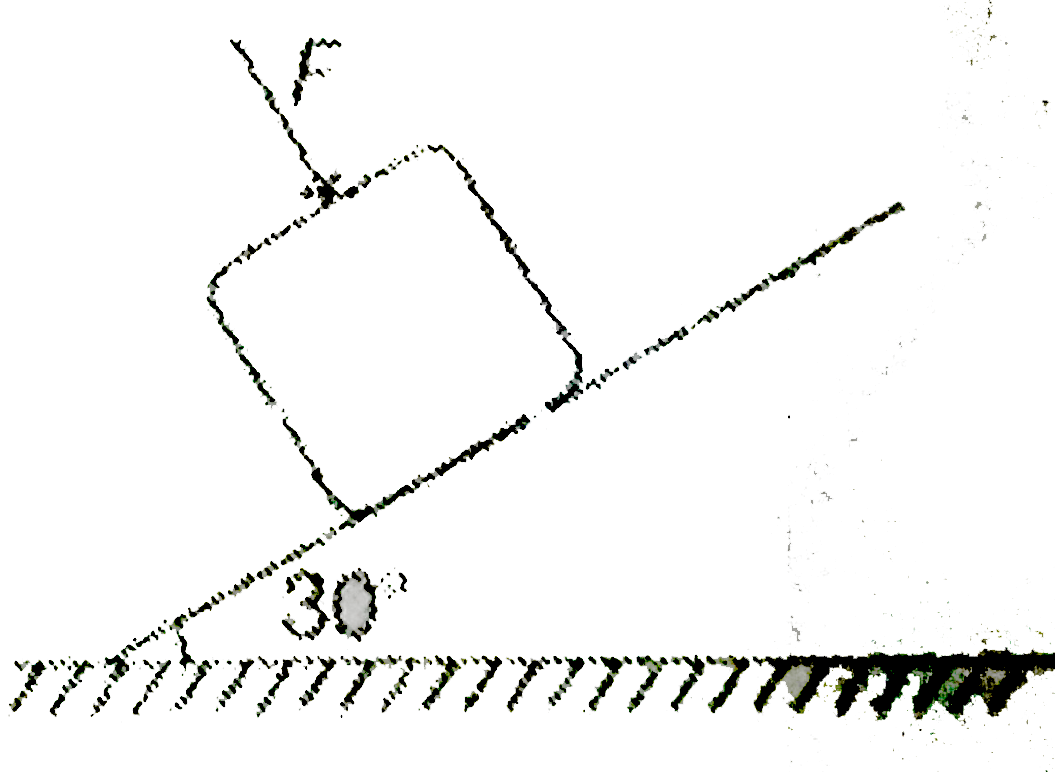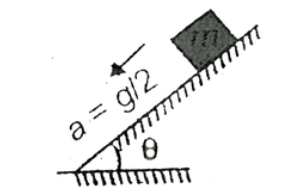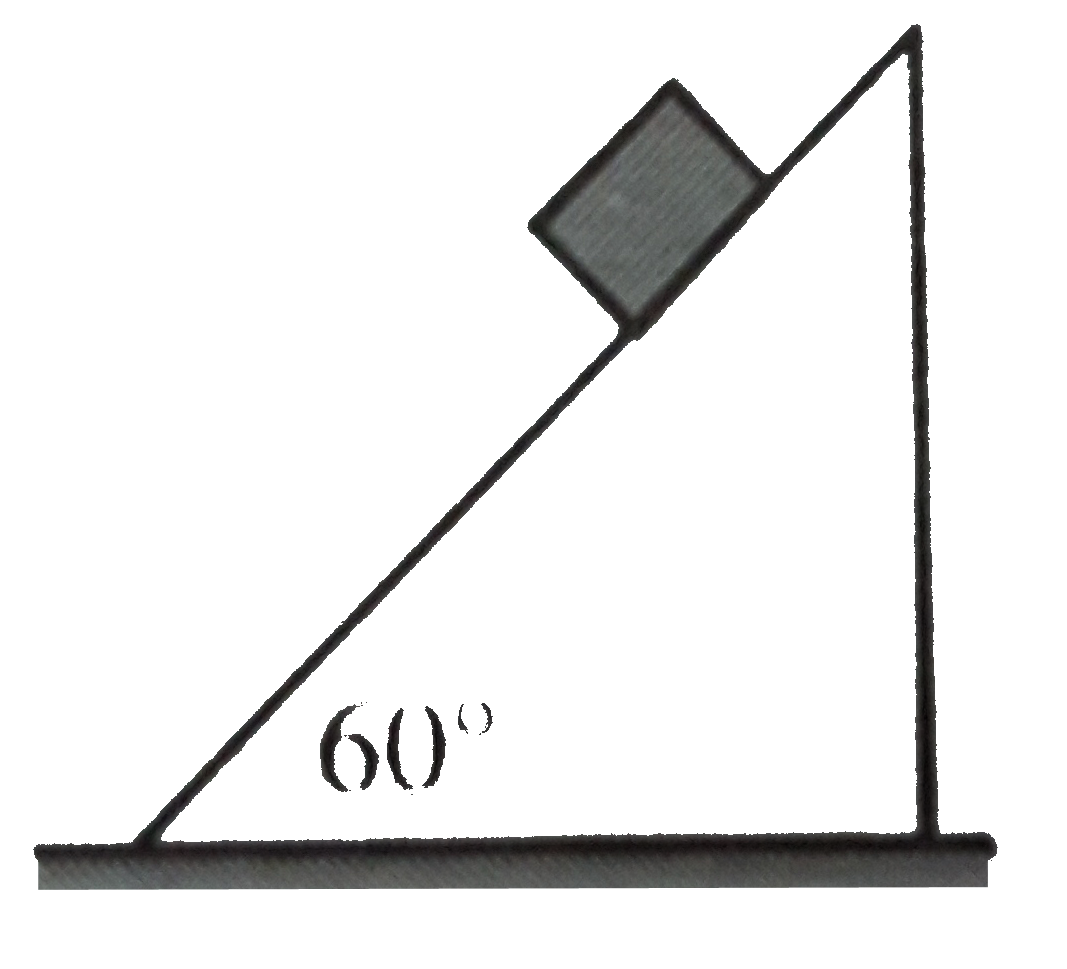A block of mass 1 kg slides down a rough inclined plane of inclination 60∘ starting from its top. If coefficient of kinetic is 0.5 and length of the plane d=2 m, then work done against friction is
2.45 J
4.9 J
9.8 J
19.6 J
The correct Answer is:B
To find the work done against friction when a block of mass 1 kg slides down a rough inclined plane of inclination 60 degrees, we can follow these steps:
Step 1: Identify the Forces Acting on the Block
The forces acting on the block are:
- Weight (mg) acting vertically downward.
- Normal force (N) acting perpendicular to the inclined plane.
- Frictional force (fk) acting opposite to the direction of motion.
Step 2: Calculate the Normal Force (N)
The normal force can be calculated using the formula:
N=mgcos(θ)
where:
- m=1kg (mass of the block)
- g=9.8m/s2 (acceleration due to gravity)
- θ=60∘
Substituting the values:
N=1×9.8×cos(60∘)
Since cos(60∘)=0.5:
N=1×9.8×0.5=4.9N
Step 3: Calculate the Frictional Force (fk)
The frictional force can be calculated using the formula:
fk=μN
where:
- μ=0.5 (coefficient of kinetic friction)
Substituting the values:
fk=0.5×4.9=2.45N
Step 4: Calculate the Work Done Against Friction (W)
The work done against friction is given by:
W=−fk⋅d
where:
- d=2m (length of the inclined plane)
Substituting the values:
W=−2.45×2=−4.9J
Final Answer
The work done against friction is:
W=−4.9J
---
The forces acting on the block are:
- Weight (mg) acting vertically downward.
- Normal force (N) acting perpendicular to the inclined plane.
- Frictional force (fk) acting opposite to the direction of motion.
The normal force can be calculated using the formula:
N=mgcos(θ)
where:
- m=1kg (mass of the block)
- g=9.8m/s2 (acceleration due to gravity)
- θ=60∘
N=1×9.8×cos(60∘)
Since cos(60∘)=0.5:
N=1×9.8×0.5=4.9N
The frictional force can be calculated using the formula:
fk=μN
where:
- μ=0.5 (coefficient of kinetic friction)
fk=0.5×4.9=2.45N
The work done against friction is given by:
W=−fk⋅d
where:
- d=2m (length of the inclined plane)
W=−2.45×2=−4.9J
The work done against friction is:
W=−4.9J
Topper's Solved these Questions
- WORK, ENERGY AND POWERBOOK - DC PANDEY ENGLISHCHAPTER - WORK, ENERGY AND POWEREXERCISE - MEDICAL ENTRANCE SPECIAL QUESTIONS
16 Videos
- WORK, ENERGY AND POWERBOOK - DC PANDEY ENGLISHCHAPTER - WORK, ENERGY AND POWEREXERCISE - MATCH THE COLUMNS
7 Videos
- WORK, ENERGY AND POWERBOOK - DC PANDEY ENGLISHCHAPTER - WORK, ENERGY AND POWEREXERCISE - CHECK POINT 6.3
10 Videos
- WORK, ENERGY & POWERBOOK - DC PANDEY ENGLISHCHAPTER - WORK, ENERGY & POWEREXERCISE - Level 2 Comprehension Based
2 Videos
- WORK, POWER AND ENERGYBOOK - DC PANDEY ENGLISHCHAPTER - WORK, POWER AND ENERGYEXERCISE - E Integer Type Questions
11 Videos
Similar Questions
Knowledge Check
A block of mass m=2kg is resting on a rough inclined plane of inclination of 30∘ as shown in figure. The coefficient of friction between the block and the plane is μ=0.5. What minimum force F should be applied perpendicular to the plane on the block, so that blocks does not slip on the plane? (g=10m/s2)
 A2.68 NBZeroC4.34 ND6.24 N
A2.68 NBZeroC4.34 ND6.24 N
A block of mass m moves with constant speed down the inclined plane of inclination θ. Find the coefficient of kinetic friction.

View SolutionA block of mass 5 kg slides down a rough inclined surface. The angle of inclination is 45∘. The coefficient of sliding friction is 0.20. When the block slides 10 cm, the work done on the block by force of friction is
View SolutionA block of mass 5.0 kg slides down an incline of inclination 300 and length 10 m. find the work done by the force of gravity.
View SolutionA block is released from rest from point on a rough inclined place of inclination 37∘. The coefficient of friction is 0.5.
View SolutionA block of mass m slides down an inclined plane of inclination θ with uniform speed. The coefficient of friction between the block and the plane is μ. The contact force between the block and the plane is
View SolutionA block of mass 2 kg slides down an incline plane of inclination 30°. The coefficient of friction between block and plane is 0.5. The contact force between block and plank is :
View SolutionA block of mass m is at rest on a rough inclined plane of angle of inclination θ. If coefficient of friction between the block and the inclined plane is μ, then the minimum value of force along the plane required to move the block on the plane is
View Solution


